Key takeaways:
- Meal planning involves organizing meals in advance, providing structure, creativity, and peace of mind for the week ahead.
- It saves time and money by reducing decision fatigue and food waste, while promoting healthier eating habits.
- Common mistakes include overcomplicating meals, ignoring leftovers, and not including a variety of food options in plans.
- Effective strategies include batching similar meals, involving others in meal prep, and maintaining flexibility in plans.
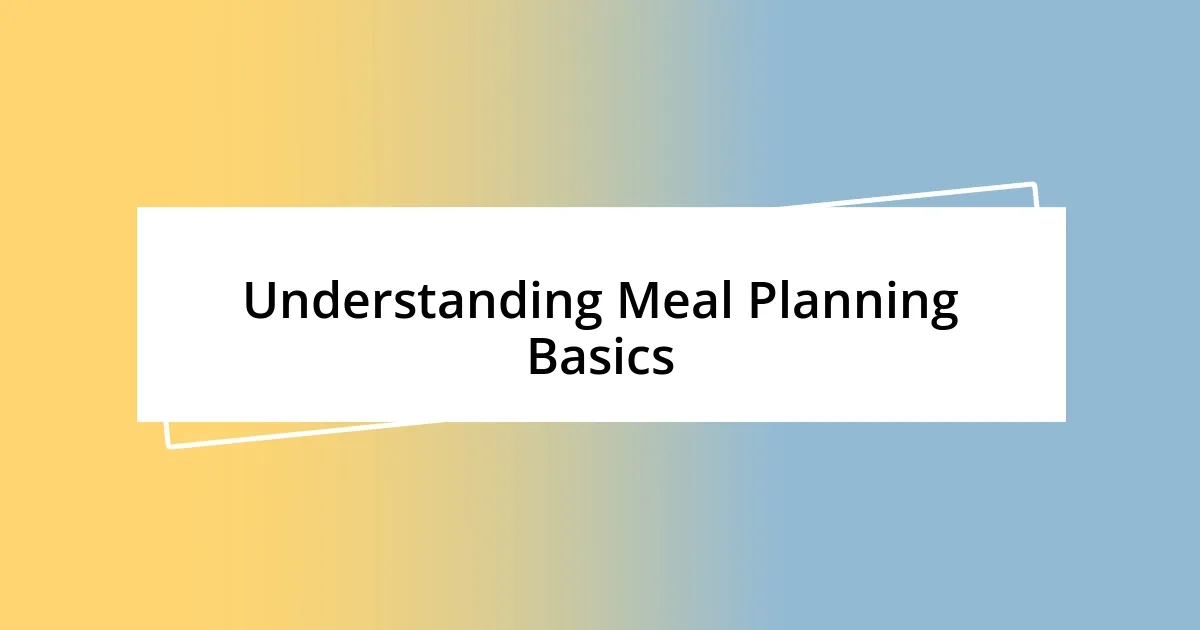
Understanding Meal Planning Basics
Meal planning is all about organizing your meals ahead of time, which can seem daunting at first. I remember the first time I tried it; my kitchen looked like a chaotic puzzle of ingredients, but once I got a hang of it, everything fell beautifully into place. Can you imagine the peace of mind that comes from knowing what you’re going to eat all week?
One essential aspect is setting aside time to plan, usually on a specific day each week. For me, Sundays became my sacred meal-planning day. It not only gave me structure for the week ahead but also turned into a creative adventure in the kitchen. How liberating it is to prepare meals that resonate with my tastes and preferences, rather than scrambling last minute!
Another crucial element is understanding portion sizes and nutritional balance. At first, I struggled with figuring out how much to cook, often ending up with leftovers I dreaded eating. I learned to focus on what truly nourished me and, more importantly, what brought joy to my meals. Don’t you think that food should be both satisfying and nourishing? With meal planning, I’ve found an inspiring way to blend nutrition and enjoyment.
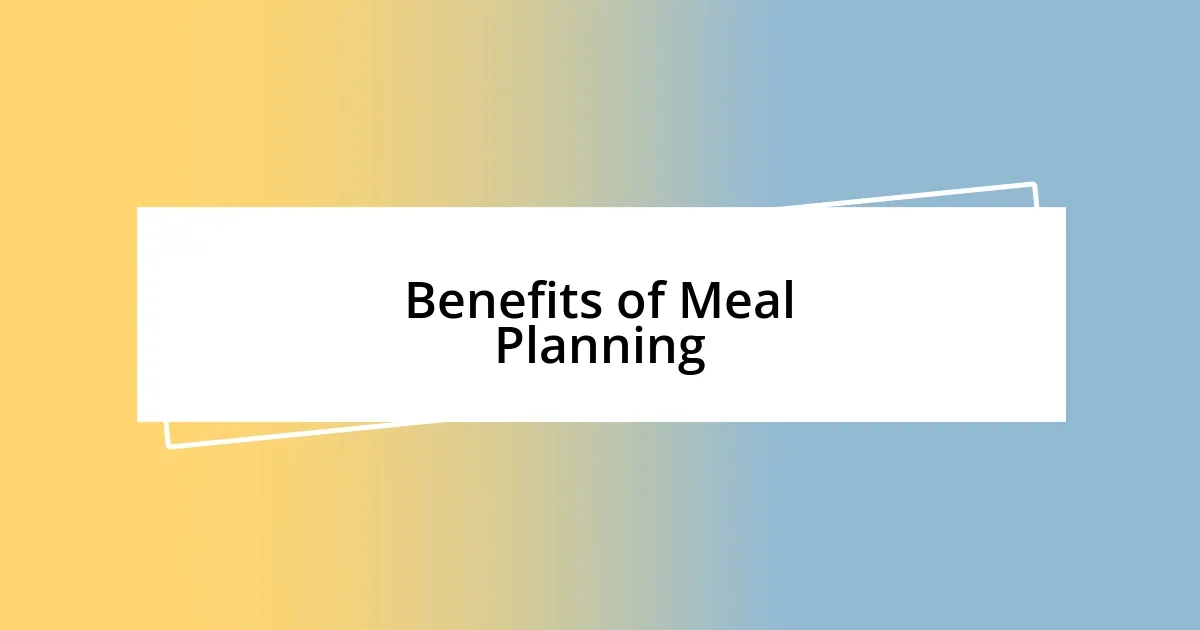
Benefits of Meal Planning
When I embraced meal planning, I quickly discovered how it saved me time during my busy weeks. Instead of deciding what to eat each night, I had everything mapped out, allowing me to focus on cooking rather than searching for inspiration. I remember one particularly hectic week at work; having my meals prepped ahead kept my energy levels stable and my mood uplifted. Isn’t it nice to know that you can have control over your meals without the last-minute rush?
Another significant benefit is the financial aspect of meal planning. Initially, I underestimated how much I could save by planning my meals. I often found myself buying ingredients that I never used, leading to waste. Once I started creating a shopping list based on my meal plan, I realized how much less I spent. Plus, I started experimenting with seasonal produce, which not only cut costs but also introduced me to new flavors. Have you looked at your grocery bills recently? Meal planning can help keep those numbers down.
Meal planning also cultivates healthier eating habits. I often found myself reaching for convenience foods when I didn’t have a strategy in place. Now, with my planned meals, I’m more conscious of what I’m putting into my body. I recall a time when I made a delicious quinoa salad that was both filling and nourishing. It felt good to fuel my body with wholesome ingredients rather than empty calories. That simple meal made me reflect on how food can truly enhance our well-being, don’t you agree?
| Benefit | Personal Experience |
|---|---|
| Time-Saving | Less time spent deciding meals allows focus on cooking and enjoying meals. |
| Cost-Effective | Reduces waste and encourages smarter grocery shopping. |
| Healthier Choices | Promotes conscious eating and helps incorporate more nutritious foods. |
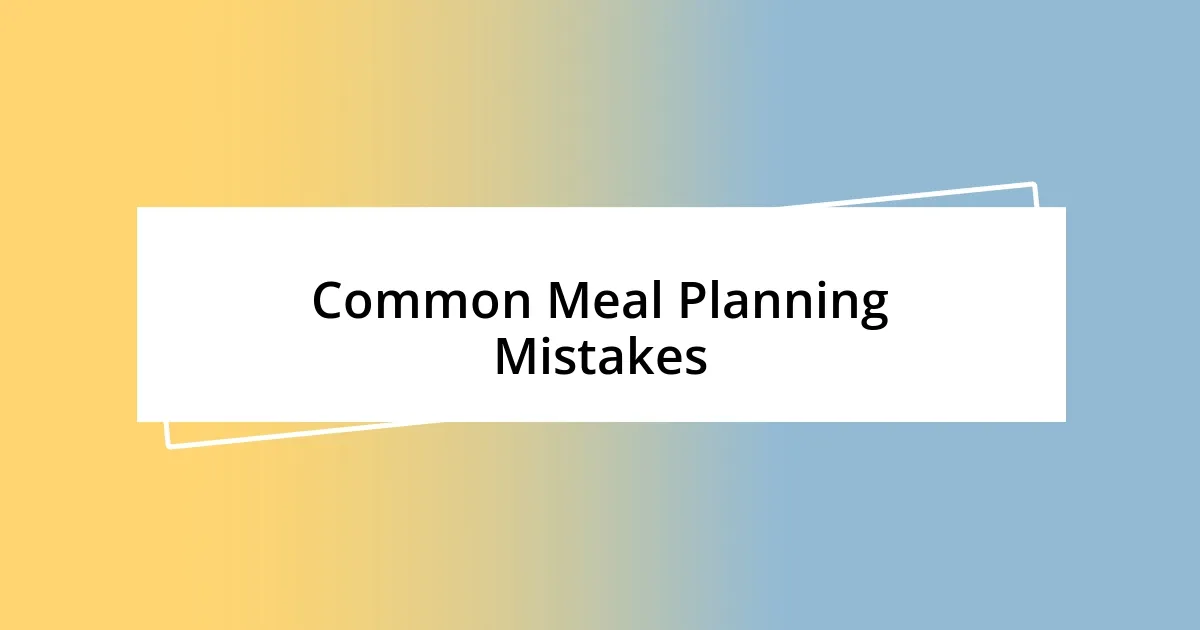
Common Meal Planning Mistakes
There are several pitfalls that can occur when embarking on a meal-planning journey. One mistake I made early on was overcomplicating my meals. I aimed for elaborate dishes that turned into a marathon in the kitchen instead of the enjoyable experience I had hoped for. Keeping it simple often leads to more enjoyable and sustainable meal prep, allowing creativity to flourish without the overwhelm.
Here’s a list of common meal planning mistakes I’ve encountered:
- Not Being Realistic: Planning meals that are too ambitious for your time or skill level can lead to frustration.
- Ignoring Leftovers: I learned to embrace leftovers, turning them into a new meal rather than warehousing them in the fridge.
- Forgetting Variety: Repeating the same meals can get dull; I started to incorporate seasonal ingredients and diverse cuisines to keep things exciting.
- Shopping Without a List: Initially, I would go grocery shopping unplanned, which often resulted in impulse buys and food waste.
- Focusing Solely on Meals: I initially overlooked snacks and breakfasts; having a well-rounded plan that includes these can make the week smoother.
The beauty of meal planning is evolving through each mistake. After all, my journey has been about finding the right balance that works for me—something I hope you can achieve too.
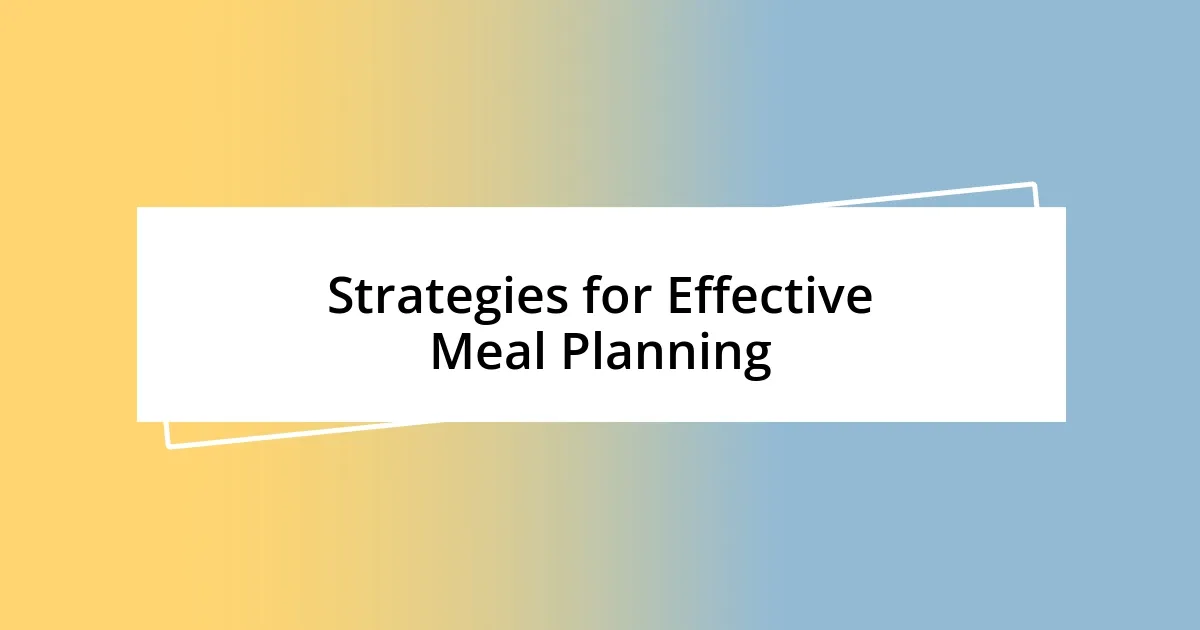
Strategies for Effective Meal Planning
One effective strategy I’ve discovered is batching similar meals. I remember one Sunday afternoon when I prepared a big pot of chili and a batch of rice. It was amazing to see how two different meals could stem from the same prep work. When I had those containers in my fridge, it felt like a safety net for the busy week ahead. Have you ever thought about how much easier it could be to have versatile meals on hand?
Another approach that transformed my meal planning is involving family or friends in the process. I once organized a meal prep day with a few close friends. We spent the day chopping, cooking, and sharing recipes, which not only made it more enjoyable but also lightened the load. It turned into a fun social event, and it felt wonderful to bond over food. How often do you get the chance to make meals with the people you care about?
Lastly, I advocate for flexibility in your meal plan. While having a structured plan is essential, life can be unpredictable. One evening, I had my heart set on tacos, but when a friend invited me out, I decided to switch gears. I learned that it’s okay to shuffle meals around. Adapting your plan can help maintain a positive mindset, making meal planning feel less like a chore and more like a supportive tool in my lifestyle. Don’t you think that’s the beauty of it?
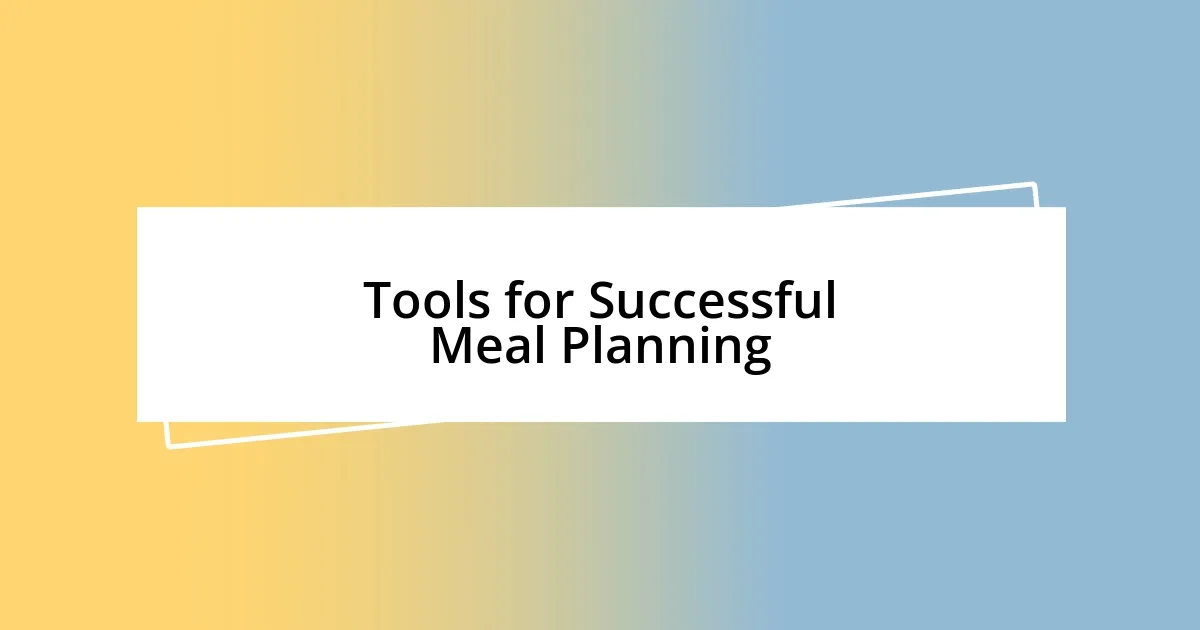
Tools for Successful Meal Planning
There are some fantastic tools that can enhance your meal planning experience. For me, a well-organized planner was a game-changer. I found that having dedicated sections for meals, grocery lists, and even notes about what worked and what didn’t really helped. It’s like having a personal assistant guiding me through the week. Have you ever considered how much clearer your thinking would be with everything laid out in front of you?
Digital apps and resources have also played a significant role in my meal planning journey. I remember trying out a meal-planning app, which allowed me to look up recipes and create shopping lists in one go. This not only streamlined my process but also opened the door to new culinary ideas. Think about it: how much easier would it be to have all those recipes at your fingertips, tailored to your dietary preferences and available ingredients?
Lastly, investing in quality kitchen gadgets can make meal prep feel like less of a chore. I recall purchasing a slow cooker, and it completely changed my weeknight dinners. I could set it up in the morning, and by the time I was home, a delicious meal awaited me. It made me wonder how many more meals I could create with minimal effort. Have you identified any kitchen tools that could simplify your cooking experience?












